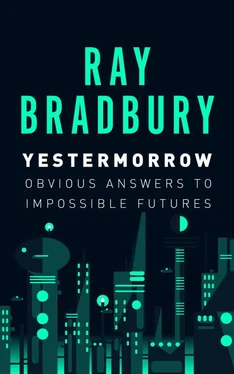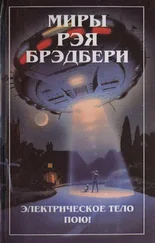Not long after, I wrote another story about a group of priests who, arriving on Mars, try to decide whether a creature that they encounter, a fiery spirit that drifts on the air, is or is not “human.”
That story, “The Fire Balloons,” suffered a similar history. Rejected everywhere, it was published many years later in a small s-f magazine in Chicago.
It is hard for us today to realize that once upon a time the civil rights movement didn’t exist. And that once upon a time was 1948, 1949, 1950.
It is similarly hard for us to comprehend the vast power and influence of various religious groups in those same years. My story about the priests on Mars was rejected by editors, again and again, fearful of offending a wide variety of church thinkers, afraid of repercussions and criticism.
On a political level in early 1950, I wrote a story titled “And the Rock Cried Out.” It told the tale of a white man and his wife who were trapped in an Indian village in South America, shortly after an atomic holocaust. The man and his wife were forced to shine shoes and wait on tables for an existence. The shoe was indeed suddenly on the other foot, for the story questioned whether the couple could make do, and accept being a white minority in a country of dark-skinned people.
Well, 1950 and the years immediately following were Joseph McCarthy years, the years of McCarthyism, years when our country was shadowed and bullied by our real and unreal fears concerning Communism in the world.
This story, like the other two, was rejected by editors afraid to tell a tale that, with all its simplicity, might be considered anti-American and therefore pro-Communist.
It is hard to remember an America so involved with such shadows and such fears.
So far, I have named only three areas into which science fiction shoved its nose again and again.
Racial relations.
Religion.
Politics.
Are there more? Yes.
Philosophy. Pure technology. Art on any level you wish to speak of it. Logic, Ethics, Social science. History. Witchcraft. Time travel.
Well, the list, as you begin to see, is endless.
Architecture? But of course! One of the grand thrills of being young and falling in love with science fiction was seeing the early drawings and paintings by men like Frank R. Paul on old magazine covers and inside with each story. They were more often than not pure architectural renderings of fantastic cities, incredible environments.
Growing up in science fiction was, then, growing up amidst Everything.
Do you see how lucky I was?
I grew up in the old field that reached out and embraced every sector of the human imagination, every endeavor, every idea, every technological development, and every dream.
Is there a better way to grow up? I can think of none.
But even while I knew this, sensed this, lived this, the culture I lived in did not sense, know, live, or believe this.
As I have said, in the late forties, s-f was still Sleeping Beauty waiting to be kissed awake by atomic bombs, hydrogen explosions but, above all, Sputnik, then Neil Armstrong bootprinting the lunar soil for all mankind.
The earliest awakenings occurred from 1948 through 1950 when Doubleday and Simon & Schuster began to publish their own lines of science-fiction books, calling special attention to the incredible imaginative qualities within the field.
During those same years, Robert Heinlein was the first pulp s-f writer to shift over into The Saturday Evening Post with his, then remarkable, Green Hills of Earth.
I followed him a short time later.
But it was only in the Eisenhower years that we really got rolling. We are accustomed to think of Ike as a rather quiet president during whose terms not very much at all happened. The facts, in Space anyway, are otherwise. Long before Kennedy made his pitch in that direction, Eisenhower had, in effect, responded to the universe and the competition, if you wish, of Russia and Sputnik. We put our rockets and then our men, into trajectory. And it was a mild, supposedly conservative, father-image president who lit the fuse.
In the following years, from 1957 on up through this very summer, an incredible thing happened. Students began to teach teachers. They snowed them with science-fiction books and stories. The teachers held out for a long while, but then the really sly students placed a book on teacher’s desk and said, “Read just the first chapter. If you don’t like it, stop.”
So the teachers muttered “Lord, Lord” under their breaths, took Heinlein or Asimov or Clarke home, read the first chapter and were hooked.
The rest is simple but amazing history. Dozens and then hundreds of books of science fiction began to be taught in junior high schools, high schools, and colleges. Dozens and then hundreds of courses and seminars sprang up around the old but newly discovered imaginative field.
Now, hardly a day passes that some new hardcover science fiction book isn’t published. Now, no weekend is without a dozen new paperback s-f books hitting the newsstands.
Why has all this happened at this particular juncture in history? Why not 25 or 30 or, for that matter, 60 years ago?
I have no easy or complete answers. The easiest and most complete would run like this:
America, above all nations, has always been a country of ideas. We have always been revolutionary, in all the senses of that much overused word.
Somewhere, years ago, I used a term for us that I think fits more than ever. I called us a nation of Ardent Blasphemers. We ran about measuring not only how things were but how they ought to be. If the wilderness got in our way two hundred years ago, we chopped it down. If the English king and his smothering friends got in our way, we borrowed some revolutionary concepts, freshened them up, and chopped him down. If death and disease got in our way, we raised medicine to its greatest disciplines in the history of the entire world and chopped death down and cured disease and invented pain-killers. If distance got in the way, we chopped it in half by running locomotives down a track and shrinking time. If time got in the way, we raced the sun around the world with jets, and now rockets, and beat it, By Gosh and By Golly, beat it all hollow! We could make the sun rise and set half a dozen times a day by rushing with improbable haste through the heavens. Blasphemy? That was our middle name.
So with our medicines and steam trains and electrical devices we Ben Franklin’d our way into and up away from twentieth-century Earth. Which is to say we stood out in rains with a damned kite and stringed key and dared God to pin back our ears with lightning. He has pinned us back a few times. For, come to think of it, in the light of all the dogmas of a great deal of religious thought in the past, we have touched the nerve of the Universal Being. We have dared to sock Death right in the midst of its most terrible grin. We have messed with mosquitoes with sprays and saved half a billion lives. We have reached up to touch the Moon and promise ourselves immortality with starships moving on and on a billion years from this very evening. We Americans are better than we hope and worse than we think, which is to say, we are the most paradoxical of all the paradoxical nations in time.
That is what science fiction is all about.
For science fiction runs out with tapes to measure Now against Then against Breakfast Time Tomorrow. It triangulates mankind amongst these geometrical threads, praising him, warning him.
And since we are at the tail end of the Industrial Revolution and well into the Technological and/or Electronic Revolution, what else is there to read except—
Science Fiction.
It is being read now at long last because it is exciting, because it is human, because it is relevant, because it is ecological.
Читать дальше











